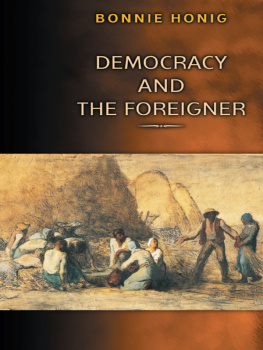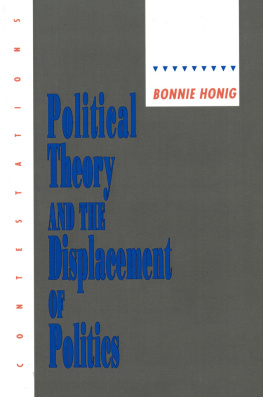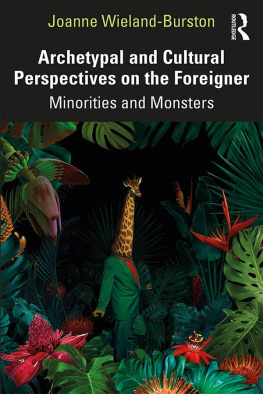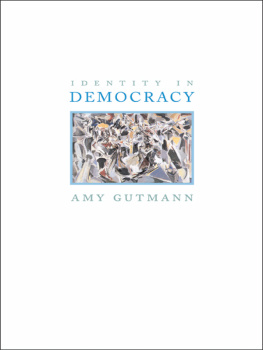DEMOCRACY AND THE FOREIGNER

BONNIE HONIG
DEMOCRACY AND THE FOREIGNER

Princeton University Press
Princeton and Oxford
Copyright 2001 by Princeton University Press
Published by Princeton University Press, 41 William Street,
Princeton, New Jersey 08540
In the United Kingdom: Princeton University Press,
3 Market Place, Woodstock, Oxfordshire OX20 1SY
All Rights Reserved.
Library of Congress Cataloging-in-Publication Data
Honig, Bonnie.
Democracy and the foreigner / Bonnie Honig.
p.cm.
Includes bibliographical references and index.
eISBN : 978-1-40082-481-6
1. Democracy. 2. Immigrants. 3. Nationalism.
4. Internationalism. I. Title.
JC423 .H748 2001
325.1dc212001016373
This book has been composed in ITC Garamond Light
Printed on acid-free paper.
www.pup.princeton.edu
Printed in the United States of America
1 3 5 7 9 10 8 6 4 2
For my parents,
David and Schewa Honig,
whose foreignness shaped their lives
and mine

Politics exists because those who have no right to be
counted as speaking beings make themselves of some
account, setting up a community by the fact of placing
in common a wrong that is nothing more than this
very confrontation, the contradiction of two worlds
in a single world: the world where they are and
the world where they are not, the world where there
is something between them and those who
do not acknowledge them as speaking beings
who count and the world where there is nothing.
Jacques Rancire

Contents


Theres no place like home. The magical phrase, repeated three times while she clicks together heels gripped by hard-won ruby slippers, returns Dorothy home from her nightmare-dream in the land of Oz. On its face, the phrase expresses a heartfelt home-yearning, as in Theres no place like home, [sigh]. Here the phrase suggests that home is so unique, wonderful, and irreplaceable a place (a place where people know me, where I can just be, in Minnie Bruce Pratts phrasing), that no other place ever lives up to it. However, the selfsame phrase unmasks this yearning for home as a fantasy. Switch the emphasis to Theres no place like home, and the phrase now seems to suggest that there is no place as wonderful as home is mythologized to be, and that includes home itself. The uncanny, punlike character of the phrase combines an unrelenting yearning for home together with an awareness that the home so yearned for is a fantasy.
Such ambivalenceits political-cultural organization into the sepa-rate, distinct desires we call home-yearning and escapismis one of this books points of departure. The desires for a place where people know me, where I can just be and for a place where I can never just be because my sense of my self is always challenged and expanded often drive the politics of foreignness traced here. Or better, perhaps these desires are themselves the effects of the politics of foreignness, symptoms of larger issues in democratic theory having to do with the freedom, agency, community, and solidarity that are the daily work of life in a more or less democratic polity.

Little did I know when I wrote the above scene-setting sentences several years ago that by the time this book was truly finished I would have written it in thirteen different studies in four different states. Such nomadism has enabled me to present my work in progress to a wide range of audiences who generously shared their perspectives with me at talks and conferences. Many others read all or parts of the manuscript along the way and provoked me to think further about issues I thought I had already settled. First and foremost, for giving me the gift of their time, and for reading drafts of chapters with an intellectual generosity to which I have already grown happily accustomed, I am grateful to some of the members of my new Chicago circle of theory colleagues, Eric Santner, Patchen Markell, Peter Fenves, and Sara Monoson. Our newest member, Miguel Vatter, arrived in time to make me attend once more to Machiavelli. Also in that circle, Linda Zerilli has been my partner in thinking about this book since its inception, and to prove it I have a stack of emails from her that is taller than I am. I thank her for her many, many, many contributions to the project.
Amy Gutmann and Sanford Levinson read the manuscript for Prince-ton University Press and provided helpful guidance and encourage-ment for the last stages of revision. Others who heard or read parts of the manuscript and commented on them to my profit include Seyla Benhabib, Lauren Berlant, Josh Cohen, Bill Connolly, Mo Fiorina, Richard Flathman, Jill Frank, Marcie Frank, Marjorie Garber, Ruth Grant, Barbara Johnson, Michael Jones-Correa, George Kateb, Steve Macedo, Harvey Mansfield, Pratap Mehta, Martha Minow, Bruce Robbins, Michael Rogin, Michael Sandel, George Shulman, Rogers Smith, Michael Warner, Patrick Weil, Stephen White, and Iris Marion Young. Late in the day, Joan Cocks graciously made time to read almost the whole manuscript and helped give it its final contours.
I have had great good fortune in research assistance over the years:thanks to Patchen Markell, Michaele Ferguson, Arash Abizadeh, Michael Bosia, Torrey Shanks, and Ella Myers.
Drafts of all the chapters were presented at various colloquia, panels, and conferences: at the Ford Foundation, MIT, several APSAs, Harvard, Rutgers, and Duke Universities, the University of Iowa, ICA in London, the American Studies Association in 1998, among others. Some of the chapters appeared in much abbreviated form as articles, and I am grateful to Sage Publications, Strategies (http://www.tandf.co.uk), and SocialText for permission to reuse material here that was first published there.
I am especially grateful to the students at Northwestern University. The first to join the new graduate program in political theory, in particular, Torrey Shanks and Ella Myers, have inaugurated here a new and exciting theory conversation of which I am fortunate to be part.
My recent association with the American Bar Foundation made me appreciate the forceful role of the iconic lawgiver in the symbolic politics of foreignness. Chapter 2 exists because of the ABF. The ABF also provided me with research funding, teaching relief, and intellectual company. I am grateful to John Comaroff, Bryant Garth, Carol Heimer, Chris Tomlins, Joanne Martin, Beth Mertz, Annelise Riles, Vicki Woeste, and, briefly, Janet Gilboy, as well as such visitors as Felicia Kornbluh, Michelle Landis, Ronen Shamir, Saskia Sassen, and Kunal Parker. Also at ABF, Renee Brown prepared the manuscript for publication with courtesy and professionalism for which I thank her.
At Princeton University Press, Ann Wald first acquired the manuscript, and Ian Malcolm adopted it as if it were his own. I am very grateful to bothto Ann for her early interest in this project and to Ian for the great care he took of it.
Next page















